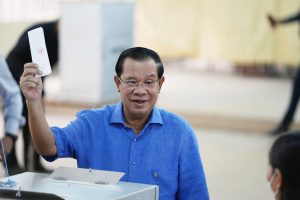The long ruling Cambodian People’s Party (CPP) claimed “a sweeping victory” in Sunday’s commune elections after the National Election Committee (NEC) said the party of Prime Minister Hun Sen was ahead in vote counting from polling stations across the country.
It was a widely expected claim on election night given the CPP’s extensive reach across the country and that it already controlled most of the 11,600-odd council seats in the 1,662 communes, clusters of three to 30 villages, that were contested.
But the NEC, which has yet to release its preliminary vote, did not release details about the actual numbers, and importantly the popular vote, in a ballot that was criticized by observers.
At commune elections in 2017 the ruling party won 50.76 per cent of the popular vote after suffering a disappointing swing of 11.04 percent, as the then opposition Cambodian National Rescue Party (CNRP) grabbed 43.83 percent.
The CNRP was outlawed by the courts a few months later and the CPP then won every seat contested at national elections in 2018.
Since then, as CNRP supporters were pursued through the courts, the Candlelight Party has emerged from its remnants, and in a country that does not do opinion polls, its overall performance as the leading opposition party is the number that matters.
That number will provide the first real indicator about voter satisfaction with the CPP government, which has been sorely tested by its crackdown on dissent, its handling of the COVID-19 pandemic, and a badly bruised economy.
And, of course, the overall vote would provide a further indication as to how the CPP and the Candlelight Party will fare at the next national poll due in July next year.
The NEC did say the CPP was leading an election in which 77.91 percent, or about 7.1 million of 9.2 million registered voters turned out. That compared with a record voter turnout of 90.37 percent five years ago, when 7.8 million out of 9.6 million registered voters cast their ballots.
From those numbers, the CPP is claiming up to 99 percent of commune chief positions. However, the Khmer Times is reporting that the CPP “looks to” have won 69 of the 105 communes contested in Phnom Penh alone.
“It’s been a successful electoral process with a calm environment, security, public order, no violence and no intimidation,” NEC President Prach Chan told journalists after the polling stations closed.
“Some political parties that lose the election always criticized the electoral process,” he said, adding there were always baseless accusations made by political parties that lost seats.
On the day, Cambodia’s elections usually run smoothly. Issues like bribery, intimidation, litigation, and violence, normally erupt in the months, sometimes more than a year, before the ballots are cast.
The U.N. Human Rights Office noted this, saying “threats, intimidation and obstruction targeting opposition candidates” had been hallmarks in the lead-up to Sunday’s commune elections and that includes at least six jailed opposition candidates.
“Candidates have faced numerous restrictions and reprisals that have hindered their activities, with imprisonment of a number of candidates that appears designed to curb political campaigning,” the U.N.’s Liz Throssell said in a statement.
Thach Setha, vice-president of the Candlelight Party, agreed, telling Radio Free Asia his party would file complaints with the NEC over alleged election irregularities, including CPP village chiefs who he says had violated election laws.
“It was not a free and fair and just election,” he said. “There was pressure and intimidation.”
As always, the CPP campaigned on its ability to provide Cambodians with “peace and security,” which still strikes a chord with senior citizens who remember the dreaded Khmer Rouge and a 30-year civil war that ended in 1998.
But about half of the voting age are under the age of 40, have little recollection of the war years and are more concerned with a crushing economic downturn, which resulted in the absolute poverty rate soaring from 10 to 17 percent.
The NEC said it will release preliminary results shortly and the official count later this month.

































